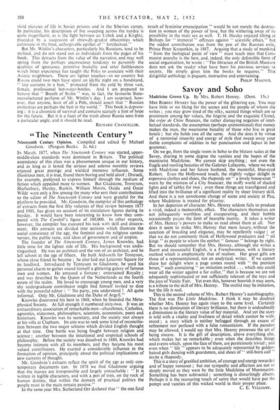Savoy and Soho
Madeleine Grown Up. By Mrs. Robert Henrey. (Dent. 15s.) MRS ROBERT HENREY has the power of the glittering eye. You may have little or no liking for the scenes and the people of whom she writes ; you may grow tired of the silky, scented things which are so prominent among her values, the lingerie and the exquisite Chanel, the crepe de Chine flounces, the rather dismaying negation of intel- lectual standards, the assumption (perhaps unintentional) that money makes the man, the wearisome banality of those who live in great hotels ; but she holds you all the same. And she does it by virtue of a torrential sincerity and energy of style that sweep away your feeble complaints of oddities in her punctuation and lapses in her grammar.
On we go, from the single room in Soho to the blatant suites at the Savoy, sharing in some degree the vanities and the hopes of the manicurist Madeleine. We cannot skip anything ; not even the fragile and rustling beauties of the Galeries Lafayette, where we walk with Madeleine and her future husband, the masterful, blue-eyed Robert. Even the Hollywood touch, the slightly vulgar delight in expensive clothes and shoes, the rhapsody on" a lovely house-coat" worn by the mistress of a City financier, the stuffy world of shaded lights and of tables for two ; even these things are transfigured and lifted into the brilliance of a significant reality by sheer literary skill. And there is a not unwelcome change of scene and society at Pau, where Madeleine is treated for pleurisy.
In her depiction of character Mrs. Henrey seldom fails to produce a vivid, indeed a memorable, effect. The characters themselves are not infrequently worthless and exasperating, and their babble occasionally passes the limit of bearable inanity. It takes a writer of Mrs. Henrey 's powers to make us read about them at all. Nor does it seem to strike Mrs. Henrey that mere luxury, without the sanction of breeding and elegance, may be repellently vulgar ; or that we do not commonly think of Hollywood producers and " oil kings " as people to whom the epithet" famous "belongs by right. But we should remember that Mrs. Henrey, although she writes a fluent and resourceful English, is a Frenchwoman, with a literary method which is emphatically that of realism. Her great gifts are those of a representational, not an analytical, writer. If we cannot share her delight when a page comes round with " the prettiest boxes," each containing" an imitation orchid. . . which one could wear all the winter against a fur collar," that is because we are not adequately sophisticated or not sufficiently tolerant of the toys and the joys of Vanity Fair. Yet even this, however boorish it may seem, is a tribute to the skill of Mrs. Henrey. The orchid may be imitation, but the life is real.
This is the second volume of Mrs. Robert Henrey 's autobiography. The first was The Little Madeleine. I think it may be doubted whether Mrs. Henrey has again risen to the same level. Certainly there is no diminution of literary brilliance, but there is undoubtedly a diminution in the literary value of her material. And yet the story is told with a vitality and liveliness of detail which cannot be with- stood ; a story which is neither befogged through an excess of refinement nor perfused with a false romanticism. If the paradox may be allowed, I would say that Mrs. Henrey possesses the art of being sincere. It is the gift of description, above everything else, which makes her so remarkable ; even when she describes things and events which, upon the face of them, are perniciously trivial ; and even when " life "appears to be adequately represented by golden- haired girls dancing with guardsmen, and shoes of" still-born calf" invite a rhapsody. This is a story of gratified ambition, of courage and energy rewarded and of happy romance ; but our sympathy and affection are not so deeply moved as they were by the little Madeleine of Montmartre. Something has been subtracted ; something is disturbingly absent. Perhaps it is the reassuring touch of satire that would have put the pomps and vanities of this wicked world in their proper place. C. E. VULLIAMY.


































 Previous page
Previous page